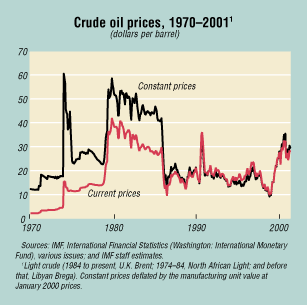This changed in early 2000, when I was given one of my first VenEconomy assignment, looking into the finances of FIEM - the Investment Fund for Macroeconomic Stabilization. Before you fall into an of irretrievable boredom-induced coma, hear me out. FIEM may seem like a recondite topic at first, but many of the economic problems Venezuela has had since the late 70s might never have happened if a mechanism like FIEM had been in place all along.
Between 1978 and 1998, per capita GDP fell by about 25%. The problem was not income - as an oil producer, Venezuela had plenty of money. In fact, given the avalanche of Petrodollars, the dismal underperformance of the Venezuelan economy was something of a puzzle to economists. How could a country as resource rich as Venezuela see such a disastrous decline in living standards?
Several hypothesis were floated, but by the late 90s, something like a consensus had emerged among academic economists. The problem, they proposed, was not so much the amount of income but its regularity. The oil market, they noted, is notoriously unstable - huge price oil booms associated with conflict in the middle east in 1973, 1979, and 1991 had been followed by prolonged price slumps. This volatile, cyclical nature of the oil market makes oil income not just variable but unpredictable in some fundamental sense.
This volatility was exacerbated by lousy government economic management. In good times, governments would spend all the income and more in wild sprees of populism. When the oil market went south, credit markets would clam up, leaving the government without the income and without the access to credit. This would force massive cutbacks in public spending, which would wreak havoc with the wider economy. These procyclical policies made the entire cycle even more disruptive to the economy than the oil market swings themselves.
Enter FIEM. The idea behind the fund was simple enough for a squirrel to understand: the idea was simply to take the "extra" revenue generated in high oil-price years and save it in the fund. Then, when oil prices dipped back down, the money that has been saved up could be used to make up some of the shortfall. The threshold set was a five year moving average of previous oil prices. When prices rose above the 5-year average, the excedent had to be saved up. When it dropped below that average, the gap could be made up from past savings.
It was a simple, elegant, well-thought out solution to a very difficult problem. The FIEM law was finally approved in 1998, months before Chavez was elected. Oil prices were so low then, that no money was accumulated at first.
As soon as oil prices went up, though, the new Chavez government found out there was some pesky law preventing them from spending all the money. This did not go down well, and Chavez immediately went about using his crushing majority in the Constituent Assembly to re-write it. This he did unilaterally, replacing the simple, straightforward floating average rule with a new, far more complicated rule that seemed to have nothing to do with the goal of smoothing out fiscal income.
Now, I found this troubling but not alarming. After all, I thought, at least they went through the motions of changing the law, even if the new law is fairly stupid.
But the moment I started to realize something was very odd indeed inside the government is when I started going through PDVSA's fiscal contribution numbers, comparing them to the rules, and realized right away that the government had started to violate its own FIEM Law reforms the second it approved them!
I looked all over for someone inside government to explain it to me, to help me work out the seeming contradiction, but I never did. The issue was far from the headlines at that point, not really making much news. So long as it flew below the radar screen, the government knew it could get away easily with violating such technical laws, even if they had written those laws themselves.
I wrote a series of articles about this for VenEconomy but never got a comprehensible response. Slowly at first, but later on like a ton of bricks, I realized what dyed in the wool antichavistas had been telling me all along: that it's not this or that law that the government is willing to break. It's the principle of submitting to laws as such that they can't stomach. If Hugo Chavez wanted to spend the extra oil income that started coming in in 2000, he was damn well going to. No random piece of sealed paper was going to stop him from doing that!

